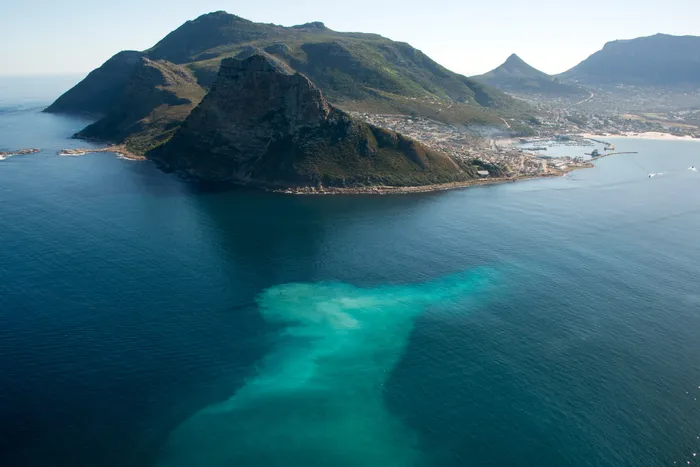Uncovering the truth: Cape Town's water contamination and the fight for transparency

Marine conservation photographer Jean Tresfon took this picture in May 2015 of what he says is a sewage plume from the Hout Bay outfall, which can pump nearly 10 million litres of raw sewerage into the sea daily.
Image: File
A groundbreaking new peer-reviewed study from a team of independent researchers, spearheaded by scholars at the University of Cape Town (UCT), has unveiled alarming evidence of denial, interference, and misrepresentation by the City of Cape Town (CCT) regarding long-standing contamination issues in its rivers, wetlands, and coastal waters.
The findings, sourced from over a decade of multidisciplinary research, reveal stark governmental oversight of scientific data that presents grave risks to public health and the environment.
Research published by the UCT team documents how CCT officials have systematically undermined independent science findings that reveal the dangers posed by raw and inadequately treated sewage that is discharged into the city's water bodies. Currently, the city discharges more than 40 megalitres of untreated sewage into the Atlantic Ocean daily. Furthermore, pollution from informal settlements and malfunctioning wastewater treatment facilities aggravates the situation, affecting the Indian Ocean and inland water systems.
Professor Lesley Green, director of Environmental Humanities South at UCT and the study's lead author, noted: “Our goal has been to bring evidence of contaminants to the attention of officials responsible for a clean environment.” The extensive contamination poses alarming threats not only to public health but also to fragile ecosystems and the local economy.
Despite the researchers’ proactive efforts to communicate their findings to both authorities and the public—through scientific publications, a dedicated website, public outreach initiatives, and even a documentary—the team has faced significant resistance, including online harassment and vehement public denunciation. In a notable incident, a political party issued a demand for an apology concerning laboratory results, showcasing the contentious relationship between science and politics in Cape Town.
Over 11 years, the research team meticulously tracked media statements, CCT reports, and political commentary, identifying 18 distinct forms of science miscommunication employed by the City. Tactics included:
- Non-disclosure of test results
- Partial or misleading interpretation of findings
- Utilising city-commissioned science to prop up political narratives
- Presenting isolated water samples as fixed indicators despite shifting environmental conditions
Green lamented that instead of engaging with the irrefutable evidence, City officials have manipulated scientific authority for the sake of brand management and political reputation. “Science is only authoritative to the extent that it is open to counter-evidence,” she asserted, highlighting the need for integrity in the pursuit of scientific truth.
The research team is calling for essential structural and political reforms to address these issues. Their recommendations include:
- Ending conflicts of interest where municipal departments simultaneously manage environmental quality and fund scientific research.
- Providing real-time data on water contamination to the public, integrated with modern predictive modelling.
- Enhancing data quality since current rolling averages obscure severe contamination peaks.
- Holding public officials accountable for misrepresentative statements on scientific findings.
- Shielding scientists from reputational harm and political retribution.
- Ensuring scientific data remains independent and subject to critique, rather than being used purely for marketing purposes.
Green also emphasised how the city’s current wastewater treatment strategies are based on outdated models that inadequately address the realities of modern pollution—specifically, the new chemical compounds that do not break down naturally in the environment. “This is a global problem and it needs all hands on deck to address it,” she urged.
Researchers have engaged with affected communities and partner institutions to methodically document the state of contamination and its socio-ecological ramifications, all while facing sustained antagonism.
Their commitment to public science is driven by the constitutional right to access information. Recent actions from the mayoral office, such as reversing a 2021 bylaw that had prohibited independent water testing and beginning to release summer beach water quality data, have been acknowledged as positive steps forward.
However, Green insists that much more is needed to rebuild public confidence in science and secure safe drinking water for all Cape Town residents.
Related Topics: